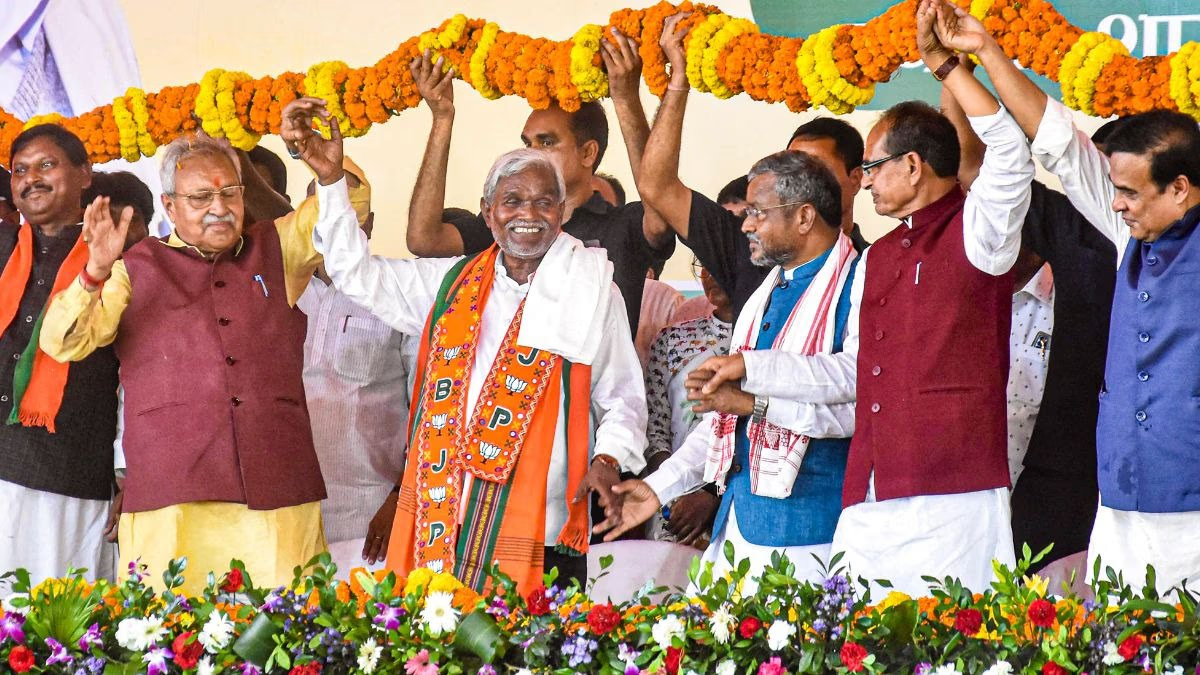Former Jharkhand Chief Minister and Jharkhand Mukti Morcha (JMM) leader, Champai Soren, has joined the Bharatiya Janata Party (BJP) ahead of the legislative elections. Known as 'Tiger,' his inclusion in BJP has raised the party's hopes. Champai Soren hails from the tribal community, which makes up 26.2% of the state's population, and he represents the Kolhan region, where BJP didn't win a single seat in 2019.
However, his limited statewide appeal and Chief Minister Hemant Soren's strategic play on tribal identity and his arrest might weaken BJP's potential gains.
The Importance of Reserved ST Seats
In Jharkhand, 28 out of 81 seats (35%) are reserved for Scheduled Tribes (ST). Historically, the party performing well here forms the government. In the last three elections, JMM has won the most reserved seats. In 2014, BJP and AJSU contested together, while in 2019, Congress and JMM formed an alliance.
In the 2009 legislative elections, JMM won 10 reserved ST seats, BJP nine, Congress two, and All Jharkhand Students Union (AJSU) one, while six others were won by smaller parties. BJP and JMM formed a post-poll coalition government. In 2013, JMM formed a government with Congress, Rashtriya Janata Dal, and others. The vote share was: BJP 24%, JMM 20%, Congress 16%, and others 36%.
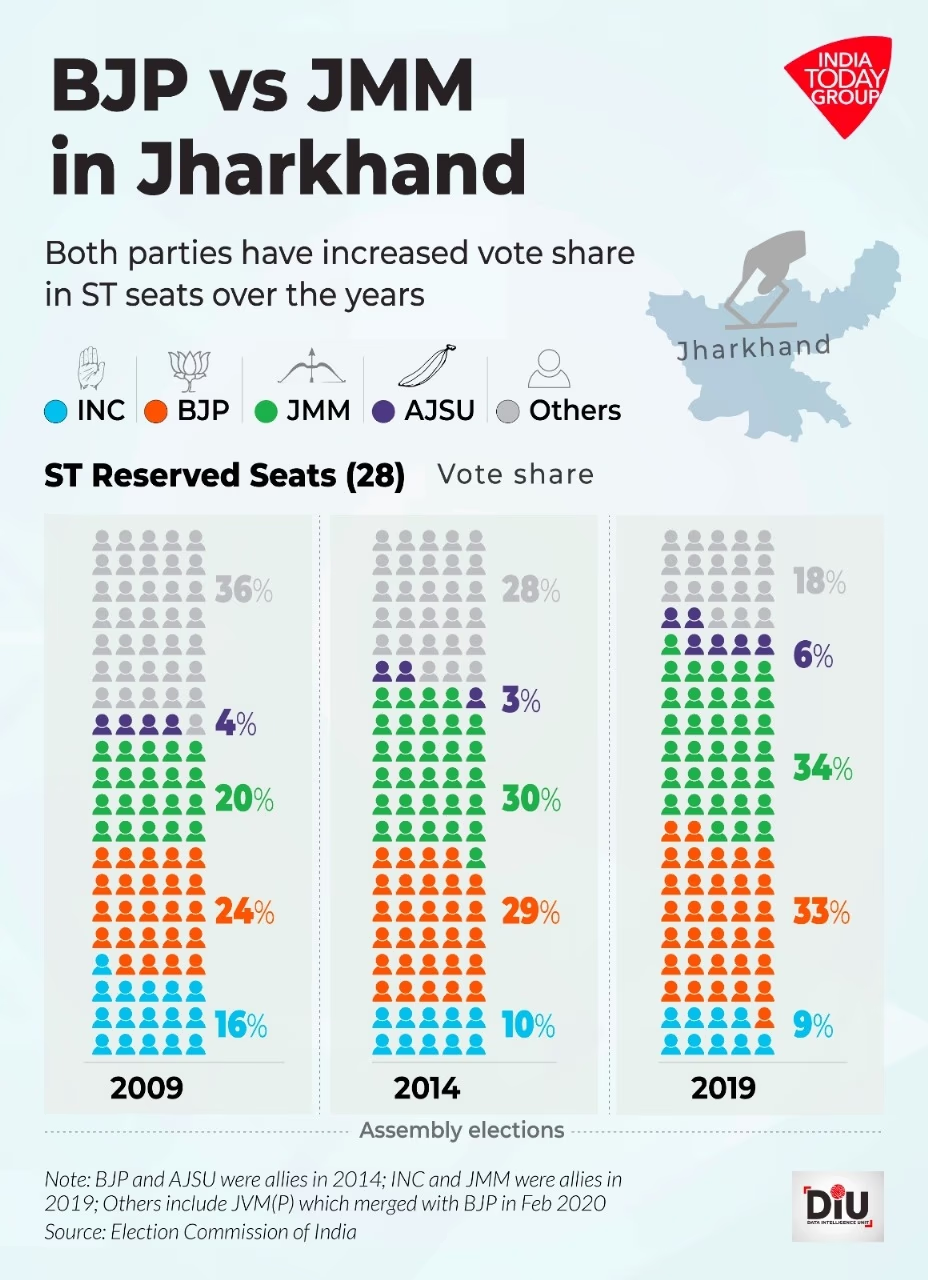
Source: aajtak
In 2014, JMM won 13 reserved ST seats (+3), BJP 11 (+2), AJSU 2 (+1), and others 2 (-4). Congress (-2) didn't win any ST reserved seats. NDA (BJP + AJSU) formed the government with 13 reserved seats. Vote share: BJP 29%, JMM 30%, Congress 10%, AJSU 3%, and others 28%.
In 2019, JMM won 19 reserved ST seats (+6), BJP two (-9), Congress six (+6), and others only one (-1). AJSU (-2) didn't win any seat. BJP faced a major defeat as UPA won 25 out of 28 reserved seats. Vote share: BJP 33%, JMM 34%, Congress 9%, AJSU 6%, and others, including independents, 18%. UPA won with 43% vote share. Almost half of UPA's 47-seat victory came from reserved ST seats.
The influence of small parties and independents diminished across these elections. Their vote share dropped from 36% to 18%. Congress's vote share also decreased due to its alliance with JMM, contesting on fewer seats. JMM increased its vote share by 14% in ST reserved seats between 2009 and 2019, with 7% coming from Congress and others. BJP also gained 9% from other parties. According to Axis My India exit poll for 2019, 58% of ST voters supported UPA, BJP 21%, AJSU 6%, and Jharkhand Vikas Morcha (Prajatantrik) (JVM-P), now merged with BJP, 6%.
In the 2024 general elections, the India Bloc (Congress+JMM+RJD) maintained the lead on 23 reserved seats, similar to 2019. Significant sympathy for jailed Hemant Soren among tribals was the key reason. BJP led on five seats.
BJP is optimistic that Champai Soren, known for his clean image and as a close aide of Shibu Soren, who contributed to Jharkhand's statehood, will attract a portion of ST voters.
BJP's Edge in Kolhan?
Champai Soren has been an MLA from the Saraikela Assembly constituency six times. He won a by-election as an independent candidate in 1991 and subsequent elections in 1995, 2005, 2009, 2014, and 2019, except in 2000. Saraikela falls in Jharkhand's Kolhan region, the southern part of the state.
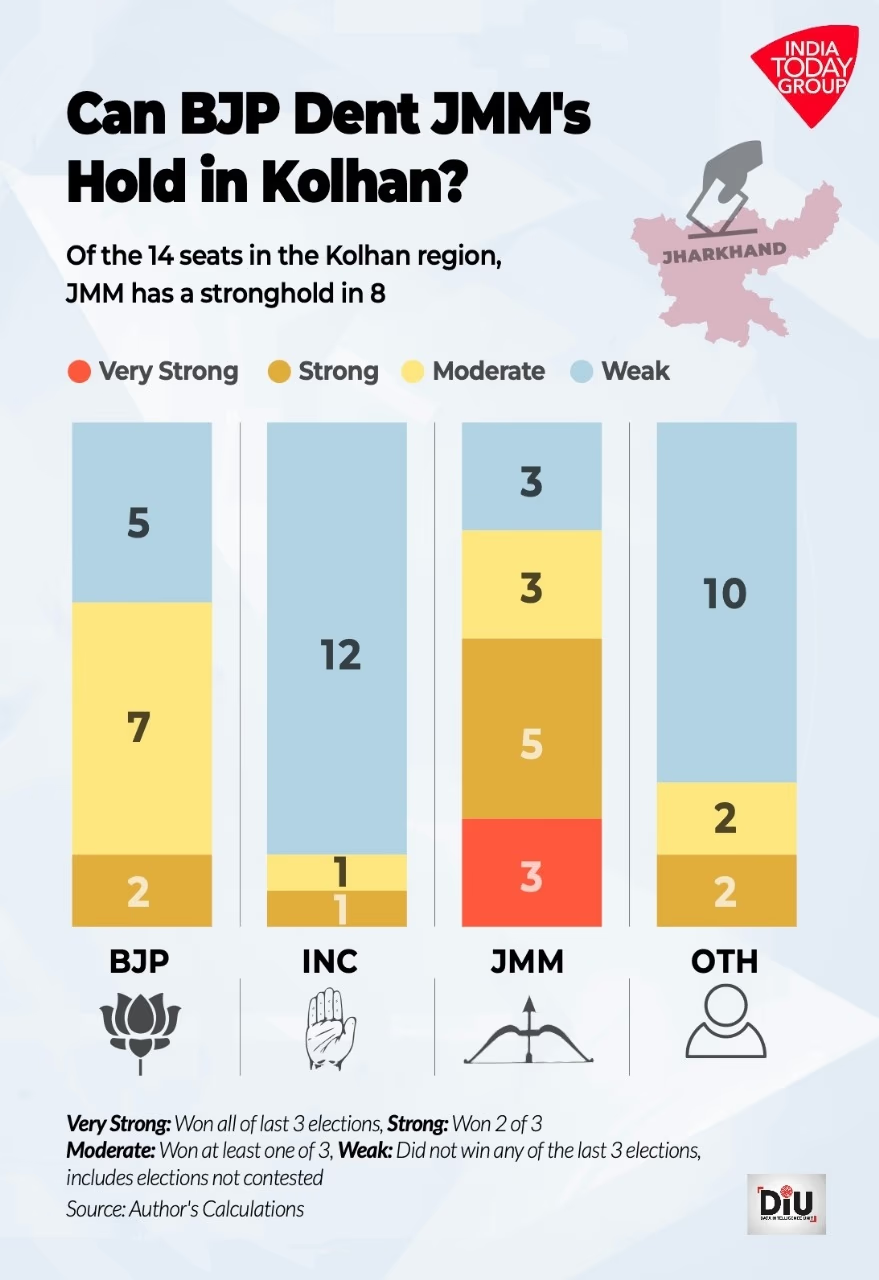
Source: aajtak
Kolhan includes 14 seats stretching across East and West Singhbhum and Saraikela districts, including the industrial city of Jamshedpur. It has nine reserved ST seats, one-third of the state's total reserved seats. JMM won all seats here in 2019.
In 2019, BJP didn't win any seat here, leading to its overall poor performance in ST reserved seats. In 2009, BJP won 6 out of 14 seats in Kolhan, JMM four, AJSU and Congress one each, and others two. In 2014, BJP-AJSU won six seats, JMM seven, and Congress none. In 2019, JMM-Congress swept 13 out of 14 seats in this region.
Given the strength of Kolhan's 14 seats, JMM considers eight seats very strong or strong, having won them in two or three of the last elections. BJP has only two strong seats and seven where it won at least once. Congress and others have limited influence.
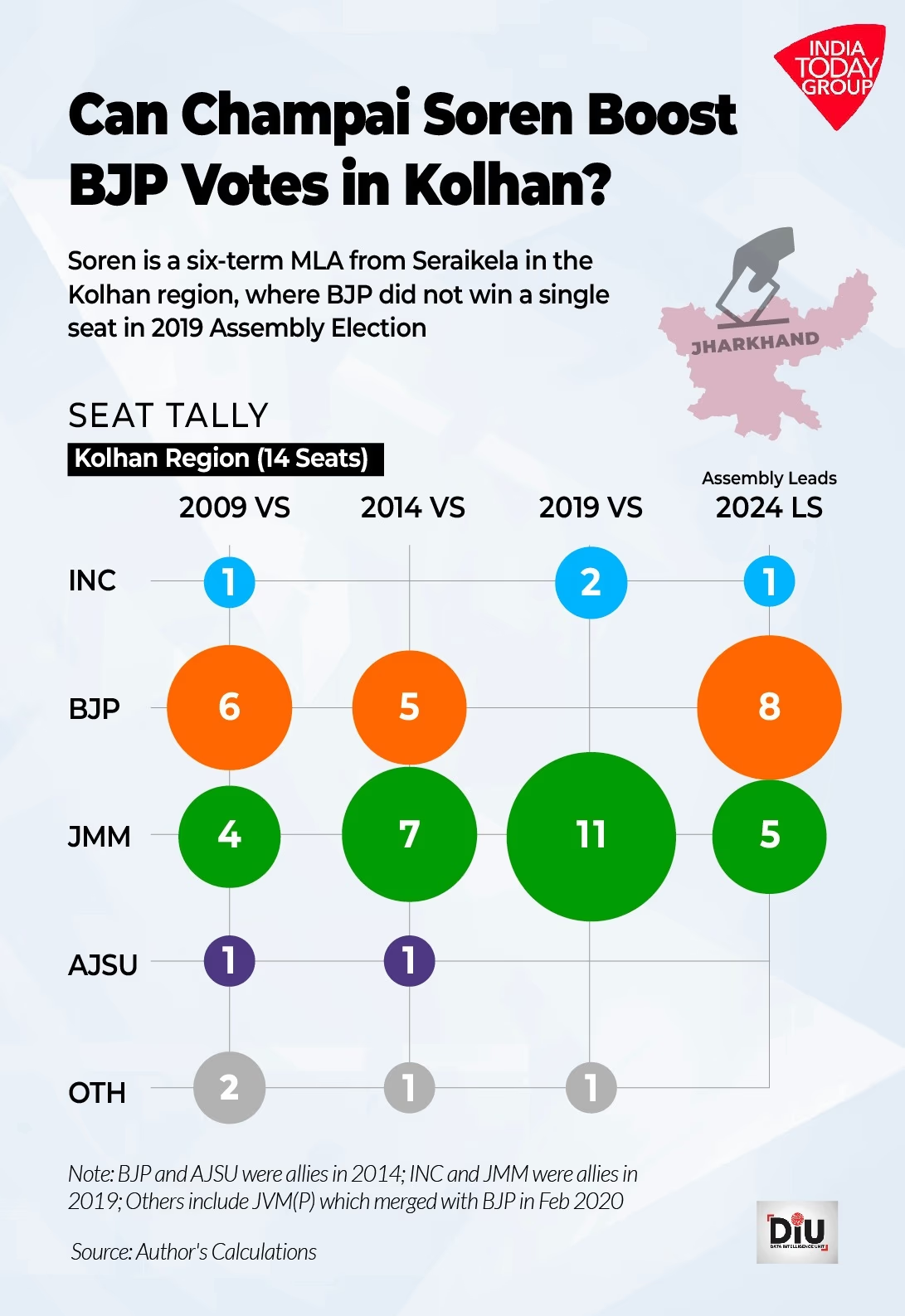
Source: aajtak
The 2019 decision to break the BJP-AJSU alliance proved costly, as BJP later won enough votes to overcome the victory margin in five seats. Vote share: BJP 29%, JMM-Congress 42%, AJSU 8%, and JVM-P 4%.
Had BJP, AJSU, and JVM-P contested together, they would have won 7 out of 14 seats. With Champai Soren now in BJP, the party hopes to gain significant advantage and reverse the trend.
Potential Downsides for BJP?
Despite his popularity in Kolhan, Champai Soren's statewide influence is limited. Like other family-controlled parties, his supporters mainly back familial groups, limiting his impact beyond Kolhan on JMM voters.
BJP has long leveraged the Sarna vs. Tribal Christian politics in the state. Most ST BJP supporters are Sarna tribals worshipping nature.
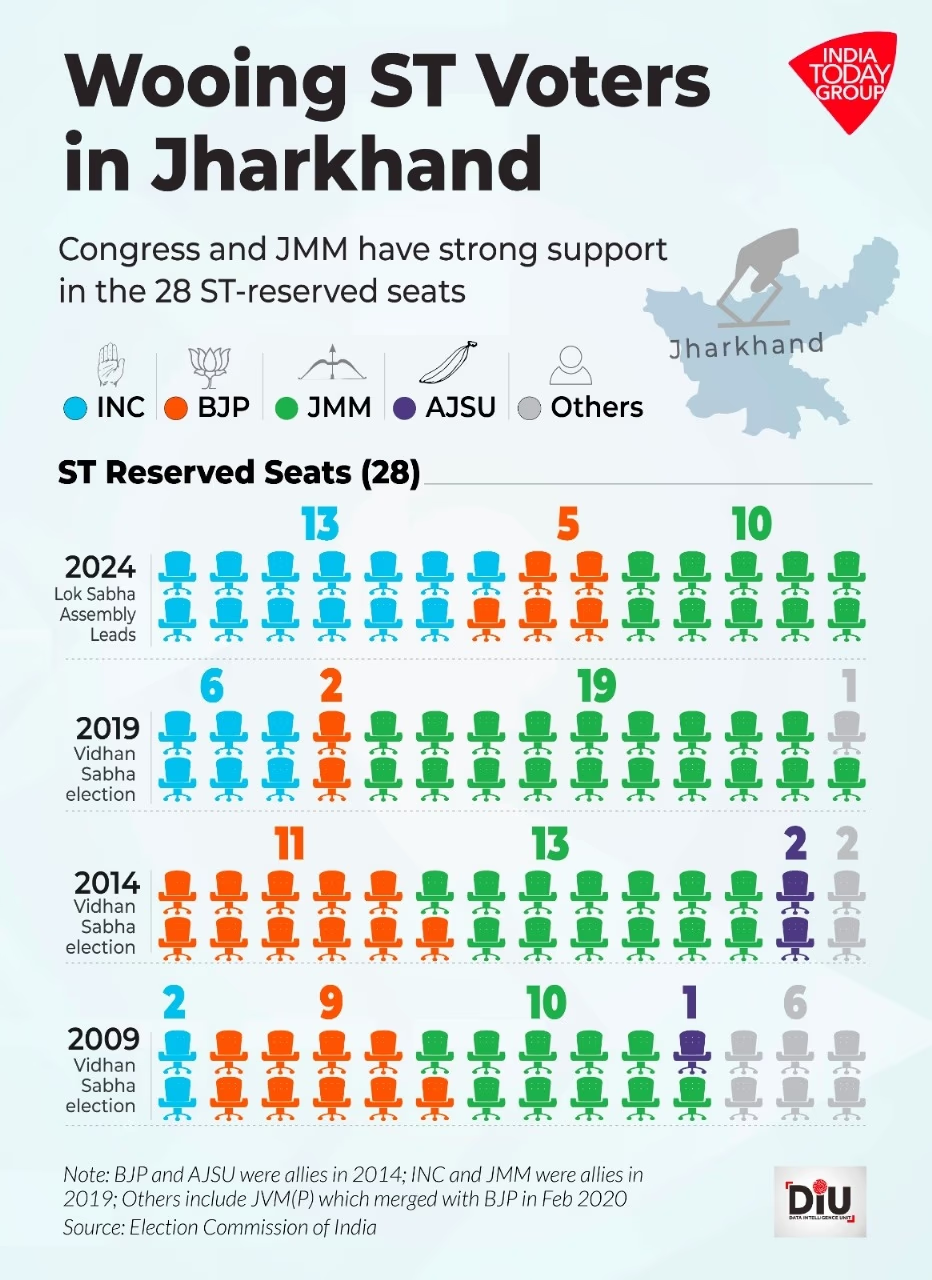
Source: aajtak
However, for the 2024 elections, the India Bloc garnered support from Sarna tribals, promising to fulfill their long-pending demand for implementing the Sarna Code, a separate religious code. BJP hesitates to implement it, fearing it might separate tribals from Hindu society.
Champai Soren previously raised this issue as Chief Minister and promised to implement a separate code in the census for Sarna tribals. JMM might exploit this to tarnish his image. Additionally, his entry might increase factionalism in the state unit, already having tribal leaders Babulal Marandi, and Arjun Munda, both former Chief Ministers.
Will Champai Soren prove to be fortuitous for BJP in Jharkhand? Only time will tell.
